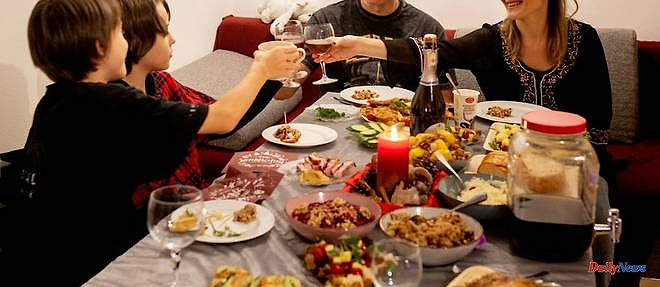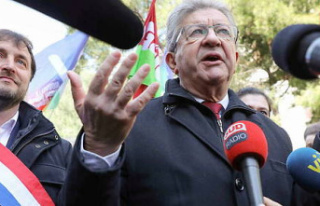Almost a year since the Titkov family left the town of Irpin, a suburb of kyiv, to live in Vienna, far from the war. Behind the step-by-step integration, the heart is still in Ukraine.
"Love home" displayed on the wall, food in abundance, a cozy atmosphere in Austria: these refugees are aware of their privilege, at a time when their country is undergoing bombardments, fighting and power cuts.
"Here we have something to eat warm in an apartment, the family is reunited far from the stress" of seeing their home destroyed in a second by a missile, testifies the 39-year-old mother, Irina Titkova.
AFP has been following this former English teacher for several months in her new life, alongside her three boys aged 10, 11 and 16 and her husband Valerii, 44, who was able to leave the territory as a father. of large family.
Like millions of their compatriots, they left everything the very day after the Russian invasion of February 24 for Austria, where they had contacts.
As a child, the father experienced the horror of the fighting in Nagorny-Karabakh between Azerbaijan and Armenia, another post-Soviet conflict. "Incapable of killing an insect", he had only one idea in mind: to shelter his children.
The Titkovs were quickly accommodated by acquaintances a stone's throw from Saint-Etienne Cathedral before finding their "home" in a residential area half an hour from the center.
They are some 90,000 in the alpine country of 9 million inhabitants to have received a "blue card", reserved for Ukrainian refugees who benefit within the European Union (EU) from special temporary protection.
This status entitles them to stay in Austria until March 2024 without applying for asylum while receiving aid.
A family can thus receive more than a thousand euros per month to cover food and rent expenses, explains Thomas Fussenegger, spokesperson for the agency responsible for supporting refugees (BBU).
Language lessons are also provided free of charge. Irina and Valerii have been going to the Deutschothek establishment since September, for three lessons a week.
In the classes, they discuss in rudimentary German with their teachers about Russian "propaganda" or the latest news from the front.
For the Russian-speaking father, "this is the most difficult part" of integration. "I'm tired after work and I have trouble concentrating, getting all this information into my head," he says.
Masseur-physiotherapist by profession, this large-built man was recruited as a handler in an American restaurant chain. He gets up at dawn.
It is "not the job of his dreams" but he hopes to obtain in the coming months a license to practice his profession. He has not given up on becoming a football coach again, a passion abandoned with the exodus.
In a hurry, Irina had accepted a job as a cashier. Exhausted by the pace, she has just thrown in the towel, preferring to work in a herbalist. "It's a peaceful place, good karma," she smiles.
"I chose this other reality, I pushed my family to think about the future" by finding refuge in a safe country, adds the slender Ukrainian, who tries to take advantage of Viennese museums and pleasures.
Like this first ball that she agreed on Saturday with her husband, at the invitation of their new friends.
However, despite her efforts, everything constantly brings her back to Ukraine.
"I want to convince myself" that everything is fine, that "we are adapting", but in reality "every day I want to go home (...), every day it is as if my soul had remained over there".
"My daily life begins by checking the news on the Telegram network: what is happening in Kyiv, Irpin, in other cities, and of course I hear from my relatives," she says, showing pictures. photos of his brother in military uniform.
His children are also homesick and hang out mostly with other Ukrainians.
After being bullied, Denys, 11, has changed classes and feels better, happy to have "more friends".
In addition to the Austrian school, they follow the Ukrainian program, a difficult double course to manage for the 500,000 Ukrainian children educated in the EU.
"The vast majority of them want to come back after the victory" and must therefore remain at the level, explains from Ukraine to AFP Serguiï Gorbachov, national education mediator.
“We were prepared to homeschool because of the pandemic” but we still have to put in place “a better-functioning system” in order to lighten “the burden” for families.
Ivanna Kobernyk, co-founder of the NGO Smart education, notes an exceptional situation. “It is probably the first time that Europe has welcomed refugees, most of whom dream of returning home and continue to study online. It is the preservation of a certain normality, of a link with the homeland” .
For Irina, this unbreakable bond is coupled with a haunting guilt.
"We don't know how to help other than sending money," she says.
She occasionally transfers hundreds of euros to her relatives, went there to support her sick uncle, also tries to convince some to join them in Vienna.
His wish for 2023: “may it be the last year of war, forever”.
After that ? "Ukraine will be in ruins", unrecognizable, "and we will have to start from scratch", worries Valerii.
02/16/2023 19:04:34 - Vienna (AFP) - © 2023 AFP












